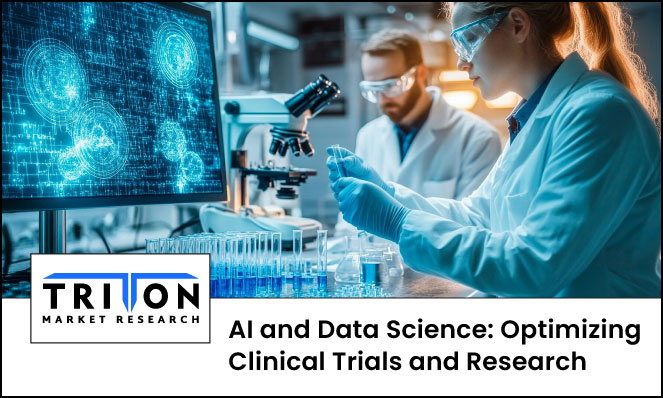



02, September 2024

The integration of artificial intelligence (AI) and data science into clinical trials represents an important shift in the healthcare industry. These technologies play a crucial role in optimizing various stages of clinical trials, from patient recruitment to data analysis. According to the National Institutes of Health, introducing a new medicine to the market costs over $1 billion. It can take up to 14 years, with a 12-month clinical trial potentially generating up to 3 million data points. By focusing on enhancing clinical trial efficiency and accuracy, AI and data science are changing how medical research is conducted and improving outcomes.
Traditional methods of patient recruitment are often slow and inefficient, relying on manual processes that can miss suitable candidates. AI, on the other hand, can analyze large volumes of data from electronic health records (EHRs), social media, and other sources to identify potential participants more quickly and accurately. For instance, AI tools have improved patient recruitment by mining vast datasets to identify suitable candidates, streamlining the process and ensuring that clinical trials are populated with the right participants. This not only saves time but also reduces costs and enhances the success rates of clinical trials, according to the US Food and Drug Administration (FDA).
What Role Does AI Play in Analyzing Real-World Data?
AI has been employed to analyze real-world data from EHRs and medical claims, aiding in the identification of patient cohorts and clinical trial design. This approach enables researchers to create more accurate and representative samples, thereby increasing the validity and reliability of trial outcomes. The FDA noted that predictive modeling in clinical trials, where AI forecasts patient outcomes based on baseline characteristics, enhances participant selection and ensures that the trials are more tailored and effective.
Are AI-Driven Chatbots Transforming Medical Research?
AI-driven chatbots are another innovative application in medical research as they provide accurate information about cancer treatments and clinical trials, improving patient engagement and education. Although they require further refinement to ensure accuracy, their potential to support clinical research and patient care is immense, according to the NCI. The future of AI and data science in clinical research looks promising, with several trends shaping the landscape. The National Institutes of Health’s (NIH) Bridge2AI program, for example, aims to generate AI-ready data and best practices for machine learning analysis, addressing complex biomedical challenges. This program exemplifies the growing trend toward collaborative and interdisciplinary approaches in healthcare research.
Role of AI in Enhancing Real-World Data Analysis
AI’s application in real-world data analysis is another area of significant impact. By analyzing EHRs and medical claims, AI helps identify patient cohorts and design more effective clinical trials. This use of real-world data ensures that clinical trials are based on comprehensive and accurate patient information, leading to more reliable results. The NIH’s Bridge2AI program is a testament to the growing importance of AI in healthcare research, generating AI-ready data and best practices for machine learning analysis.
Additionally, AI’s potential in clinical research is vast, with applications ranging from natural language processing (NLP) to machine learning (ML) to generative AI. These technologies analyze medical literature, extract relevant information, and generate new insights that drive innovation in healthcare. For example, the National Cancer Institute (NCI) funds numerous projects that integrate AI to enhance decision-making and care delivery. AI technologies, such as computer-aided detection and digital twins, are being refined to improve cancer screening and treatment planning. Digital twins, which are computerized ‘twins’ of patients, model medical interventions and provide biofeedback before actual treatment, enhancing the precision and efficacy of interventions, as per the FDA.
Machine Learning (ML) involves algorithms that improve through experience, enabling the identification of patterns in data that can predict drug efficacy. Besides, it helps analyze complex datasets to find correlations that might not be evident through traditional methods. In this regard, Dr. Reddy’s Laboratories’ subsidiary Aurigene introduced an AI and ML-assisted drug discovery platform in April 2024 that uses an iterative ML process for logical and effective chemical design, accelerating projects from hit identification to candidate nomination.
In June 2024, IQVIA launched the OneHome Clinical Trial Technology Platform, utilizing AI and data science to optimize various aspects of clinical trials, particularly in drug discovery. This Gen AI platform is designed to support decentralized trials, enhancing processes such as patient recruitment, real-time data monitoring, and trial management. By integrating with electronic health records (EHRs) and other data sources, OneHome can more efficiently identify eligible participants, potentially reducing recruitment times and improving trial outcomes. The platform’s AI-driven analytics enable continuous monitoring of patient data, allowing for timely interventions and adaptive trial designs, which may lead to more streamlined and accurate clinical trials. This approach demonstrates the increasing role of advanced technologies in enhancing the efficiency and effectiveness of clinical trials.
Case Study: AI in Oncology Clinical Trials
In a recent clinical trial focusing on oncology, AI was utilized to streamline patient recruitment and data analysis. The trial aimed to evaluate the effectiveness of a new immunotherapy treatment for lung cancer. Traditional recruitment methods have been challenging due to the specific patient criteria required. By implementing AI-driven tools to analyze EHRs, the research team identified eligible participants more efficiently.
This approach reduced recruitment time by 30%, enabling the trial to commence sooner than anticipated. Throughout the trial, AI algorithms continuously monitored patient data, providing real-time insights and identifying any anomalies. This proactive monitoring ensured prompt intervention when necessary, thereby maintaining the integrity of the trial and enhancing patient safety. The use of AI also facilitated adaptive trial design, allowing modifications based on interim results, which improved the overall efficacy of the study.
Data science plays a crucial role in managing and analyzing clinical trial data. Its applications in healthcare include clinical trial data management, statistical analysis, and predictive modeling. Handling large and complex datasets allows researchers to draw meaningful insights that drive the development of new treatments and therapies.
For example, data science tools facilitate the visualization of healthcare data, making it easier for researchers to interpret complex results and make informed decisions. Real-time monitoring of clinical data ensures that trials are conducted efficiently, with issues identified and addressed promptly. Predictive modeling is particularly beneficial in clinical trials are it can forecast patient responses to treatments, allowing for more personalized and effective therapeutic approaches. This capability is especially valuable in designing adaptive clinical trials, which can modify protocols based on interim results, thus improving trial efficiency and patient outcomes, according to the FDA.
In summary, AI and data science are redefining research and clinical trials by enhancing efficiency, accuracy, and patient outcomes. Their applications range from improving patient recruitment and data management to advancing predictive modeling and personalized medicine. As these technologies continue to evolve, they promise to bring about significant breakthroughs in healthcare, paving the way for a more effective and efficient medical research landscape.

Prevalent cases of terrorist attacks in today’s world is increasing the need for severe standards of security for public safety, and the global market for biometric technology scrupulously accommoda..
Prevalent cases of terrorist attacks in today’s world is increasing the need for..